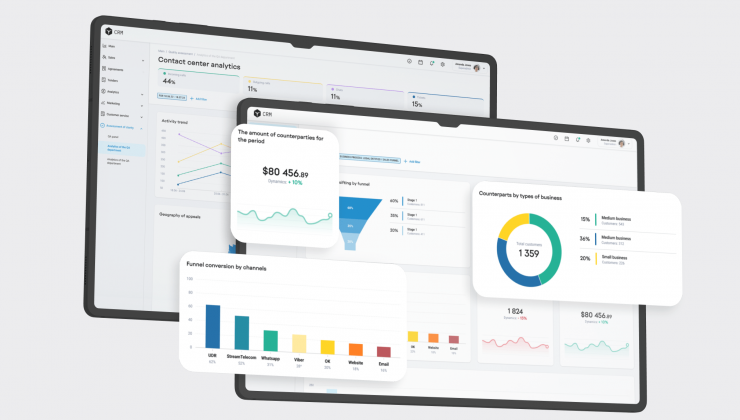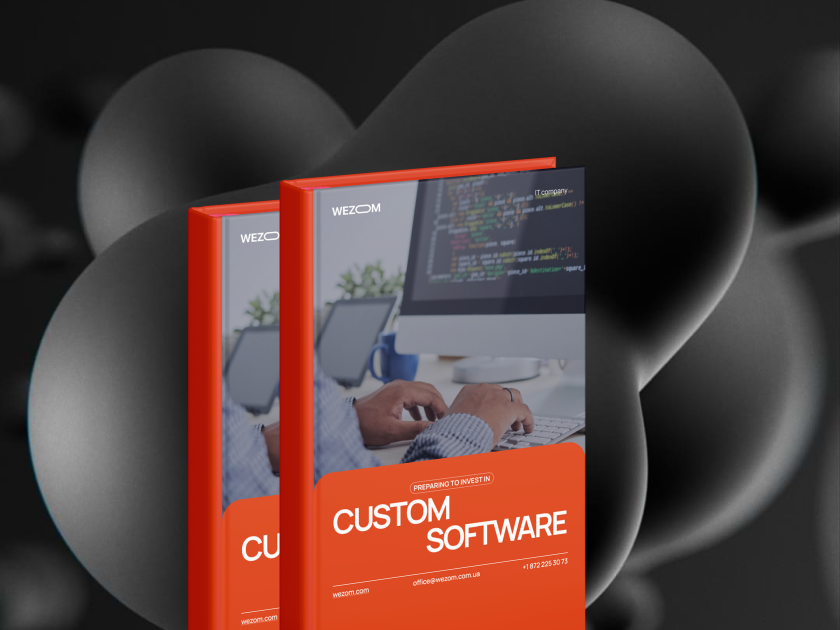Once upon a time, in the sunny state of California, there lived a CEO named Bill. Bill was an energetic and determined person, under whose careful guidance a company (whose name we cannot disclose due to an NDA) was thriving.
As the time was passing by, the business under Bill's leadership grew into a conglomerate of 17 companies. To manage the conglomerate, Bill and his employees used a total of 11 software products (including Microsoft Dynamics). Until one day, on one of those rare summer evenings when the California sky was covered with rainy clouds, Bill decided: "Enough! This can't go on any longer!"
At the very next meeting, Bill informed his employees that they needed "a centralized system to help track deals, automate marketing, and improve customer service."
– "Small business CRM or enterprise CRM?" came the voice of a young manager, John, who, truth be told, had long been thinking about a comprehensive CRM solution but was too shy to bring it up to the management.
– "What's the difference?" – Bill asked, preparing to listen attentively. John took out his smartphone and began reading information from open sources (this was happening in 2021, and ChatGPT wasn't that popular yet).
What is a CRM for Small Business
Customer Relationship Management or small business CRM is a software designed to manage customer relationships in small companies. The main features include:
- Contact management: storing and organizing information about customers, partners, and suppliers.
- Sales tracking: monitoring deals, managing the sales funnel, forecasting.
- Marketing automation: planning and conducting campaigns, newsletters, and promotions.
- Reporting and analytics to evaluate the effectiveness of financial and operational business metrics.
- Integration with other systems: email, calendar, accounting software.
Advantages: ease of use, affordability, quick return on investment.
Disadvantages: CRM options for small businesses are very limited, and such a system has scalability issues. They are good for starting out, but as the business grows, you need more space and capabilities.
What is an Enterprise CRM
Enterprise CRM system is more complex and functional. Among its main tasks are:
- Scalability: the ability to handle large volumes of data and support a large number of users.
- Advanced analytics: deep analysis and complex reporting for making strategic decisions.
- Extensive integration capabilities with other corporate systems, such as ERP, BI, and others.
- Automation of all possible processes: marketing, sales, and service, to increase efficiency.
- Customization: high degree of customization to meet specific business needs.
Also, Enterprise CRM platforms require a fundamentally different approach to security to protect data and comply with regulatory requirements. For instance, implementing AES Encryption.
Advantages: designed with future growth and changes in mind. They easily scale and adapt to new requirements and increasing data volumes. They serve large customer bases and include extensive features for analytics and reporting, capable of processing data from multiple sources.
Disadvantages: higher cost, complexity of implementation and maintenance.
Bigger means better?
Small CRMs are like multitools: a bit of contact management, simple reporting, all neatly wrapped in a user-friendly interface. You can easily track what Olivia bought and how many times she came back for a refill.
Enterprise CRMs are like fully equipped battle stations. They offer deep analytics, automation, and integrations with other crucial business systems. It's like switching from a regular bicycle to a spaceship. But! Not everyone needs or always needs a spaceship.
Perhaps, then it makes sense to first develop an ERP CRM for small business and then add functionality as business needs to grow?
We asked our Project Manager about this:
"Sometimes, we might offer a simple solution if there's no budget for deploying a large-scale project at the moment. But in such cases, we always include custom modules, features, and other integration capabilities in advance. If you don't do that, and the number of users/operations significantly increases, you'll have to awkwardly patch certain modules. This will end up being even more expensive, it will perform poorly, and overall, doing it right from the start is much more profitable and easier than redoing it. It's like planning to build a skyscraper but pouring the foundation for only one floor, then trying to finish the rest in the style of the Weasley family's house”
Investing in powerful and scalable enterprise CRM software from the beginning will pay off in the long run. Such a decision will allow for effective process management and staying competitive in the market.
*Note: ERP (Enterprise Resource Planning) is a system for managing enterprise resources: finances, production, supply chain, logistics, human resources, etc. ERP and CRM can be integrated with each other into a single business platform.
How is Bill doing?
Let's return to the beginning of our story. In Bill and his team's situation, we had no other options but to propose Enterprise CRM solutions. Considering anything else for the niche of gas and electricity distribution services would have been strange.

After the first meeting with stakeholders, the team identified the specific needs of the industry and established key functional requirements. Design, architecture, development, and testing were conducted using the Agile methodology, with each sprint being approved by the client. Over 30 specialists worked on the project!
Technical stack
For the backend, we chose Python, and for the frontend, JavaScript, leveraging the capabilities of Node.js and various frameworks to ensure performance and flexibility. The CRM platform was deployed in the cloud using AWS (Amazon Web Services) to ensure high availability and fault tolerance. For the UI/UX process, we followed the UI/UX Nieelson Norman standard and IBM design thinking methodology.
Result
The client received a CRM system that fully met their expectations and significantly increased operational efficiency. After releasing the Minimum Viable Product, we conducted a series of training seminars for the client's employees and provided detailed documentation.
Currently, the team is working on technical support and regular system updates. Additionally, they are creating a custom CRM SaaS platform so that the client can offer it to their partners on a paid subscription basis.
You can read more about the Case here:
Which solution would be suitable for your project?
We could confidently answer this question during a free consultation. However, if for some reason you're not ready to engage with us directly yet, we can offer an alternative option.
A questionnaire that will help you focus your attention in the right direction. But we want to warn you upfront that this is not a guide to action, but just a way to roughly outline what could be an effective solution for your project.
What is the size of your company?
- Less than 50 employees
- 50 to 500 employees
- More than 500 employees
How many customers or contacts do you have in your database?
- Less than 1,000
- 1,000 to 10,000
- More than 10,000
What functionality do you expect from CRM?
- Basic contact management, sales tracking, simple reporting
- Advanced analytics features, marketing automation, integration with other systems
- Full range of capabilities, including advanced analytics, custom development, integration with ERP and BI systems
What is your budget for CRM implementation?
- Up to $5,000
- $5,000 to $50,000
- Over $50,000
What are your time frames for CRM implementation?
- From one to three months
- Six months
- More than 6 months
How important is the scalability of the CRM system for you in the future?
- Low need
- Moderate
- High need for scalability
How often do you plan to use analytics and reports?
- Rarely, mainly for basic tables
- Regularly, to improve business processes and make decisions
- Constantly, for in-depth data analysis and strategic planning
What systems and tools are you already using, and do you require integration with them?
- Minimal integrations, mainly email and calendar
- Some (marketing tools and accounting software)
- Many, including ERP, BI, and other corporate systems
What level of customization do you expect?
- Minimal, basic settings
- Moderate, tailored to specific processes
- High degree of customization and development of unique solutions
How important is support and maintenance for your CRM?
- Minimal support, ability to resolve issues independently
- Regular support and staff training
- Ongoing support, including 24/7 assistance and update management
Results:
- More answers "a": You would most likely benefit from a CRM for small businesses. These systems offer basic functionality, are easy to implement, and have an affordable cost, which is ideal for small teams with limited budgets and needs.
- More answers "b": You might benefit from something in between small business and enterprise CRM. Perhaps you should consider a CRM system with advanced features that can scale with your business and has a moderate cost.
- More answers "c": You would probably be better off choosing an enterprise CRM. These systems offer a wide range of capabilities, high degree of customization and integration, suitable for large companies with large data volumes and complex business processes.
Anyway
The choice between CRM enterprise vs small business is a decision that needs to be made very carefully, taking into account the specifics of your business and its plans for the future.
Our development team is ready to help you choose and create a custom CRM, ERP, business, or SaaS platform. We offer solutions tailored to the characteristics of your business and create products that grow with you.


